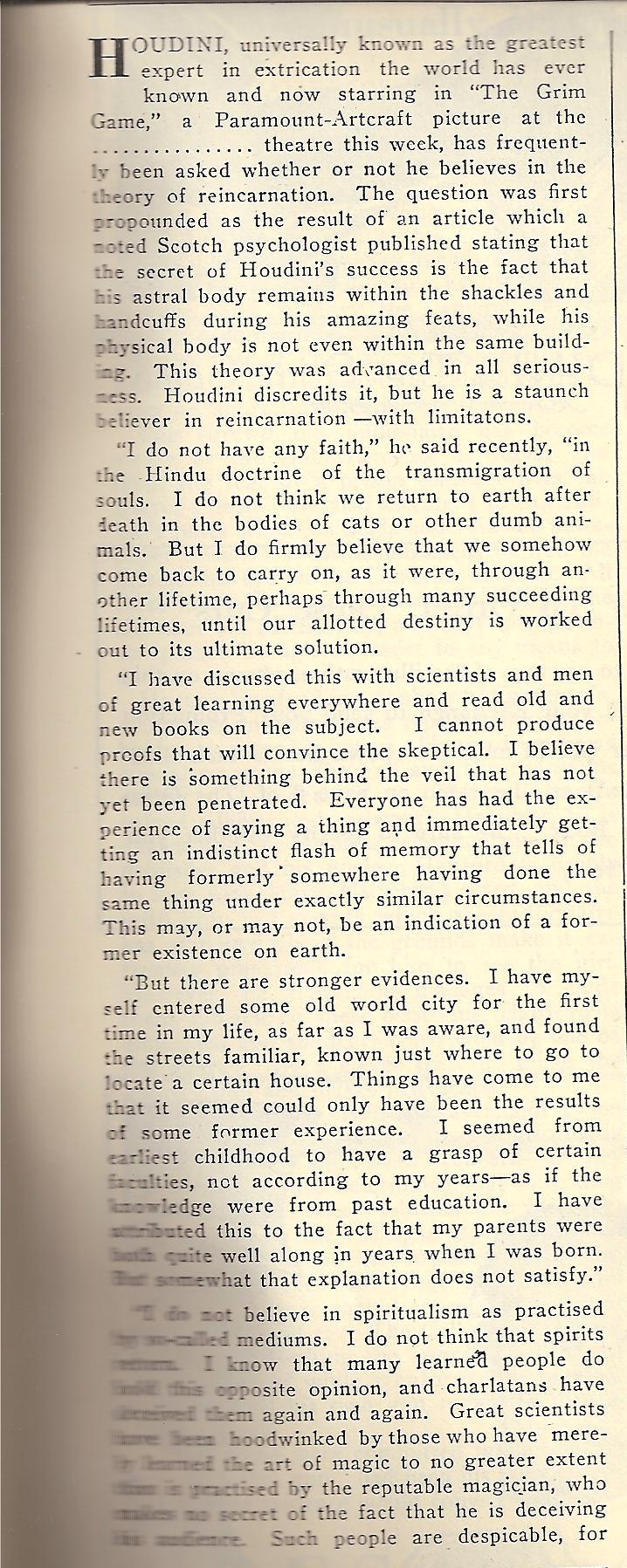PainKiller
Scholar
Did Harry Houdini believe in reincarnation?
There was a press release for "The Grim Game" (a film that featured Harry Houdini), which quoted Houdini as saying.

http://harryhoudinicircumstantialevidence.com/?p=279
A full version can be found online here:
http://harryhoudinicircumstantialev...13/10/Fort-Wayne-Indiana-19-Oct-1919-Ad-4.jpg
There is also this from magician Norman Bigelow:
http://www.wildabouthoudini.com/2012/01/houdini-reincarnation-and-man-named-von.html
In his book on Houdini entitled Death Blow (1983), Bigelow also writes:
So what do we think folks? I know the above information is controversial but I have not seen it discussed on this forum.
There was a press release for "The Grim Game" (a film that featured Harry Houdini), which quoted Houdini as saying.

http://harryhoudinicircumstantialevidence.com/?p=279
A full version can be found online here:
http://harryhoudinicircumstantialev...13/10/Fort-Wayne-Indiana-19-Oct-1919-Ad-4.jpg
There is also this from magician Norman Bigelow:
In 1975, I spent and entire afternoon talking shop with historian Walter Gibson. He spoke freely about Houdini's belief in reincarnation. Gibson told us he had research material in his files on two people whom Houdini claimed to be in former lives. One of them was a German magician named Von Treck who failed in a buried alive stunt. He also told us Houdini went around everywhere talking about reincarnation
http://www.wildabouthoudini.com/2012/01/houdini-reincarnation-and-man-named-von.html
In his book on Houdini entitled Death Blow (1983), Bigelow also writes:
The following is pure Houdini from the Literary Digest November 20, 1926: "In an interview Houdini gave the Free Press some time ago, he reiterated his ideas on the possibility of life after death, and we read on: he had faith that death meant a return to earth in another human form.
Houdini said, "There is something to the theory of reincarnation. Just how much, I cannot say, to nor do I believe it will greatly profit us to seek tear aside the veil. In due time it shall be lifted and we shall see with Milton, the bright countenance of truth. I firmly believe, and this belief is based in investigation, observation and, in a measure personal experience that somehow sometime we return in another human form to carry on, as it were, through another life time, perhaps through many succeeding life times, until some strange destiny is worked out to its ultimate solution. I cannot believe the good that is in us ever dies, that the great things we do are ever wasted, or that we — those of us who have developed individual traits of character or accomplish distinctive works for good —shall perish utterly or fail to reap the
reward of good things well done here on earth. Possibly the great intelligence that rules the universe plan beyond our ken knows what lives shall be most essential to the well being of the world and sends them back to finish what they have begun and have been forced to lay down before the beckoning finger of the dark angel."
So what do we think folks? I know the above information is controversial but I have not seen it discussed on this forum.

